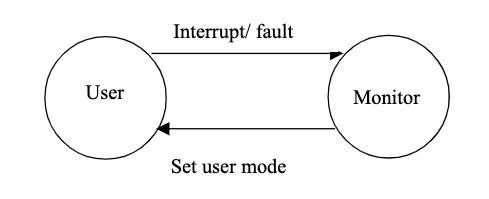System Calls
All backend operations are to be executed or triggered through the system call.
It’s basically an API that helps us communicate with the the backend operations
Different operating systems have their own System Call API structures
Methods to Pass Parameters to System Calls
- Pass through a register
- Drawback: Limited number of register, how to pass more parameters?
- Store in a block of memory
- This approach is used by linux and solaris
- Push the parameters into the stack
Context Switching
Switching from User Mode to Kernel Mode or Vice Versa
Mode Bit
Decides what mode will the operating system will be utilising
| Bit | Context |
|---|---|
| 0 | Kernel Mode |
| 1 | User Mode |
- Basically an operating system operates in two modes
In order for the CPU to be able to differentiate between a user process and an operating system code, we need two separate modes of operation: user mode and monitor mode (also called supervisor mode, system mode, or privileged mode). A bit, called the mode bit, is added to the hardware of the computer to indicate the current mode: monitor mode (0) or user mode (1).
User Mode
User processes are executed here
Kernel Mode
Authorised access is needed here
All system calls are to be executed in Kernel mode


